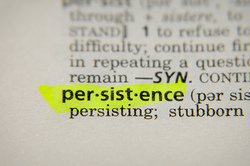A Lesson for Ed-Tech Startups in Vocabulary Words
Research shows that you need to know 65,000 to 75,000 words to be able to read and write well as an adult. That’s a LOT of words. It’s actually pretty overwhelming if you think about it. How can teachers possibly help their students learn all of those words?
 My advice … just take it word by word.
My advice … just take it word by word.
I know you’re probably rolling your eyes thinking, “That’s it? That’s your advice? Even if I were to teach 10 words a day (a huge feat!), that would only be 1,800 words a year. That’s nowhere close to 75,000 words!”
That may be true, but don’t forget that:
- Every word learned counts! Every new word learned matters. The words you teach might just come in handy for your students in their other schoolwork, in an important conversation, or on the SAT or ACT.
- Teaching vocabulary promotes a love of words. It encourages your students to seek out and learn vocabulary that will help them better express themselves in all aspects of their lives.
- Vocabulary learning has a compounding effect. Knowing words helps you learn other words and better understand the words you already know. For example, once students know the word pompous, it’s a lot easier for them to learn related words like pontificate or egocentric or pretentious.
- Vocabulary learning supports reading comprehension. Studies show that the most effective way for students to develop a rich vocabulary is for them to read more. The more words students know, the more they can comprehend and learn from what they’re reading.
This same principle applies to ed-tech startups. When you’re launching a startup, people often ask, “What’s your target market?” Typical answers you’ll hear include, “The 3.7 million teachers in the U.S.” or “The 1 billion people learning English worldwide.”
 You can see where I’m going with this. When your target market is so big relative to your limited resources as a startup, it’s easy to end up feeling overwhelmed and unsure of your next steps. Instead, it sometimes pays to dream big, but think small. One piece of advice I’ve been given is to think of three target markets:
You can see where I’m going with this. When your target market is so big relative to your limited resources as a startup, it’s easy to end up feeling overwhelmed and unsure of your next steps. Instead, it sometimes pays to dream big, but think small. One piece of advice I’ve been given is to think of three target markets:
- Total Market: This is the overall market that your startup will participate in, once you’re successful. If we take Khan Academy as an example, their total market nowadays is probably everyone in the world with Internet access. But that wasn’t their focus when they launched in 2006.
- Addressable Market: This is the market that your startup aspires to play in over the next three to five years. For Khan Academy, their addressable market a few years in was probably American students who needed help in math and science. Over time, they’ve expanded into other subjects, languages, countries, and formats, but it didn’t happen overnight.
- Initial Target Market: This is your initial focus in the first year or two of your startup’s existence. For Salman Khan, the initial focus was on high school math instruction via YouTube videos. His targeted approach and early success allowed him to grow and expand far beyond that!
So, whether we’re talking about vocabulary learning or launching an ed-tech startup, sometimes it does pay to dream big, but think small. By taking it word-by-word, or market-by-market, you never know where you may end up.
Thoughts? Let me know @professorword!
Until next time,
See also:
- Vocabulary Strategies for Visual, Auditory, and Kinesthetic Learners
- Beyond Fiction: Expanding What Counts as Meaningful Student Reading
- Words Mean More to Students When They’re Personal
- Students Can Learn Vocabulary as They Read Online
- What’s in a Startup Name? How to Choose One That Fits Your Company
Photo Credit: Flickr user Mark Hunter and Uberof202

How to see remembered passwords in microsoft edge,i am also use this Edge web browser in my android mobile.
This is one of the finest and valuable blog for us.